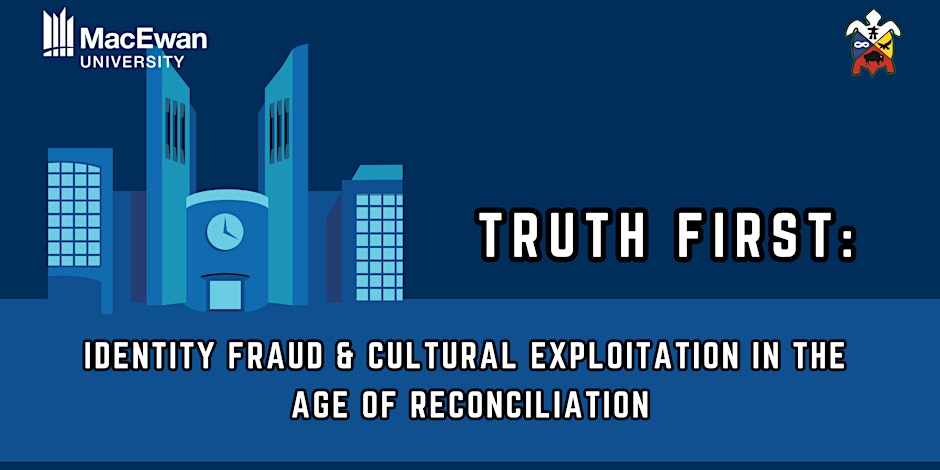Join us for a thought-provoking event at the MacEwan University Feigel Conference Centre where we will delve into the complexities of identity fraud and cultural exploitation in today’s world. Through insightful discussions, we aim to shed light on these pressing issues and explore ways to address them in the age of reconciliation. Don’t miss this opportunity to be part of a meaningful conversation!
The event will feature distinguished speakers, including Dr. Kim TallBear, Dr. Darryl Leroux, Dr. Celeste Pedri-Spade, and Nadia Bourque. The moderators for the event will be the creators and hosts of 2 Crees in a Pod: Terri Cardinal & Amber Dion.
BIOS
Kim TallBear (she/her) is a citizen of the Sisseton-Wahpeton Oyate, a Dakota nation in present-day South Dakota. She is Professor and Canada Research Chair in Indigenous Peoples, Technoscience, and Society in the Faculty of Native Studies, University of Alberta. She is the author of Native American DNA: Tribal Belonging and the False Promise of Genetic Science. Dr. TallBear is the co-founder of the Summer internship for INdigenous peoples in Genomics (SING) Canada. In addition to studying genome science disruptions to Indigenous governance and to Indigenous self-definitions, Dr. TallBear studies colonial disruptions to Indigenous sexual relations. She is a regular panelist on the weekly Indigenous current affairs podcast, Media Indigena. She is also a regular media commentator in outlets such as CBC, CNN, The Washington Post, The New Yorker, the LA Times, APTN, and the BBC on topics pertaining to Indigenous peoples, science, and technology; the politics of self-indigenization; and Indigenous sexualities. She is a board member of the Oceti Sakowin Writers’ Society, a tribal writers’ society for Dakota, Lakota, and Nakota writers. You can follow Dr. TallBear’s monthly posts on her Substack newsletter, Unsettle: Indigenous affairs, cultural politics & (de)colonization.
Darryl Leroux (French Canadian) is an associate professor in the School of Political Studies at the University of Ottawa. For over a decade, he has been studying transformations in white identities, particularly as they pertain to false claims to Indigenous identity. In 2019, he published Distorted Descent: White Claims to Indigenous Identity, which explored the role that genealogical research plays in the self-indigenization movement. He has spoken widely about the topic, including at nearly fifty universities in Canada, the United States, Norway, New Zealand, Great Britain, and the United Nations. His work has been published in aboriginal policy studies, American Indian Culture & Research Journal, Critical Ethnic Studies, Ethnic & Racial Studies, Interventions, Memory Studies, and Social Studies of Science, among others. His current research explores the creation and circulation of family lore in white settler families through an analysis of the public statements released by high-profile individuals exposed by the media for making false claims to an Indigenous identity.
Celeste Pedri-Spade, PhD, is an Ojibwe Anishinaabekwe and member citizen of Nezaadiikaang (Lac des Mille Lacs First Nation) located in Treaty 3 territory. In 2022, Celeste became McGill University’s first Associate Provost of Indigenous Initiatives and in this role, she oversees the University’s ongoing response to the 52 Calls to Action articulated by the Provost’s Task Force on Indigenous Studies and Indigenous Education. Before arriving at McGill, she was the Queen’s National Scholar in Indigenous Studies at Queen’s University. Celeste began her academic career at Laurentian University where she served as an associate professor and the inaugural director of the Maamwizing Indigenous Research Institute. Her current research interests include Anishinaabe kendasaawin, critical pedagogies, Indigenous governance, settler colonialism, and Indigenous visual/material culture. As a research-based artist, she has led several Tri-Council-funded research projects related to reclaiming Indigenous women’s visual histories, and the role of Indigenous art in Indigenous sovereignty. Apart from her research within a traditional academic setting, Celeste carries out research for Indigenous political/territorial organizations related to Indigenous governance, Indigenous education, issues of membership/citizenship, and Indigenous education. As a practicing artist and advocate for forms of public scholarship and research creation, she has also exhibited her work in national and international galleries. Celeste received her PhD in Anthropology from the University of Victoria.
Nadia Bourque is a proud member of the Metis Nation of Alberta (also known as the Otipemisiwiak Metis Government which translates to ‘the people who own themselves’) and is aslo a member and resident of the Kikino Metis Settlement in northeastern Alberta. Born to a Metis family and community in Lac La Biche, Alberta, Nadia was raised by a large family of grandparents and parents who were actively involved in the Metis political realm within Alberta whom she credits as instrumental in instilling a strong sense of Metis identity, culture, and values from a very young age. Nadia’s father, Gary Bourque, is a former leader with the Metis Nation of Alberta and she is also the sister of NHL former ice hockey player and Olympian, Rene Bourque. Nadia graduated with a Master of Social Work degree from the University of Calgary in 2010 and has been a provincial and more recently, a federal public servant within the Social Services and Child and Family Services sectors for over 17 years. She is passionate about the ethnogenesis of Metis peoples in Canada and the beauty and strength of Metis identity and culture. She shares insights and speaks to Metis issues drawing on her own experiences of Metis family and community as the foundation of her expertise. Nadia is married to Jarrod White from Kikino Metis Settlement and has one daughter, Mila, who is an avid athlete in the Alberta Youth Soccer League.



